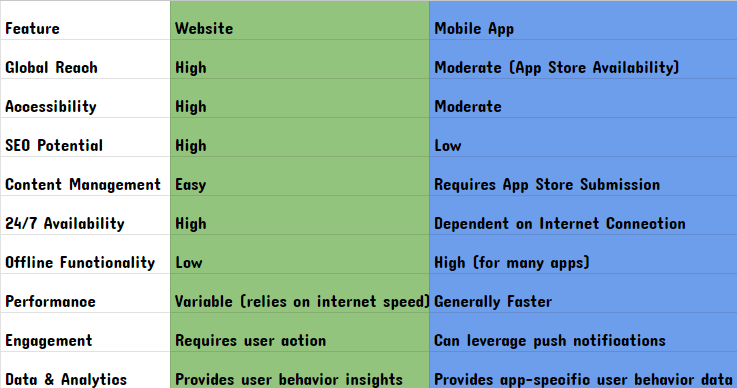Businesses must carefully consider how they present themselves online. One of the key decisions is whether to invest in a business website or a mobile app. Each option has its unique advantages and potential drawbacks. This article explores the differences between websites and mobile apps, providing insights into which might be the best fit for your business and future trends in digital presence.
Understanding the Basics
Business Website: Your Digital Shopfront
Think of your business website as your prime piece of real estate on the internet. It’s the first impression potential customers get, and just like a brick-and-mortar store, it needs to be inviting, informative, and easy to navigate. Here’s why a well-crafted website is crucial for any business:
- 24/7 Availability: Unlike a physical store with limited hours, your website is always open. Customers can browse your products or services, learn about your brand, and even make purchases – all at their convenience.
- Global Reach: The internet breaks down geographical barriers. A website lets you showcase your business to a worldwide audience, expanding your reach far beyond your local market.
- Content Marketing Hub: Websites are fantastic platforms for content marketing. You can publish informative blog posts, captivating videos, or even host online courses – all designed to attract, engage, and educate your target audience.
- SEO Powerhouse: Search Engine Optimization (SEO) is the magic behind getting your website discovered online. Websites allow you to implement SEO strategies to rank higher on search engine results pages (SERPs), driving organic traffic and valuable leads.
- Data & Analytics: Modern websites come built-in with analytics tools that provide valuable insights into user behavior. See which pages are most popular, where your visitors come from, and use this data to optimize your website and marketing efforts for better results.
- Content Management Systems (CMS): Gone are the days of needing coding skills to update your website. User-friendly CMS platforms like WordPress, Joomla, or Drupal make it easy for anyone to add, edit, and publish content, keeping your website fresh and engaging.
Mobile App:
- Mobile apps have become an extension of ourselves. They offer a convenient and personalized way to interact with businesses on the go. But what makes a mobile app stand out from a website?
- Native Experience: Mobile apps are built specifically for smartphones and tablets. This allows them to leverage the device’s features like cameras, GPS, and fingerprint scanners, providing a seamless and intuitive user experience.
- Push Notifications: Apps can send targeted notifications directly to users’ devices, keeping them informed about promotions, updates, or personalized offers. This can significantly boost engagement and drive sales.
- Offline Functionality: Many apps can function even without an internet connection. This is particularly valuable for situations where internet access might be limited. Users can access features, view saved content, or even complete tasks while offline.
- Performance & Speed: Mobile apps can streamline complex processes and offer faster performance compared to websites. This is because they are designed to work efficiently with the device’s hardware and operating system.
- Increased Customer Loyalty: Apps can foster a closer relationship with customers. Loyalty programs, gamification elements, and personalized recommendations can all be integrated into an app to create a more engaging and rewarding user experience, leading to increased customer loyalty.

The choice between a website and a mobile app depends on your specific business needs and target audience. However, in today’s mobile-first world, having a strong online presence often requires a combination of both. A website acts as your comprehensive digital hub, while a mobile app provides a convenient and personalized on-the-go experience for your customers.
Key Differences
User Experience (UX)
When crafting a digital presence, the choice between a website and a mobile app hinges on factors like accessibility and user experience. Websites reign supreme in universality. Anyone with a web browser and internet connection can access your website, regardless of device or operating system. Responsive design ensures the website adapts seamlessly to different screen sizes, offering a consistent experience for desktop, tablet, and mobile users. However, websites may not fully leverage the hardware capabilities of a specific device. This can lead to a less intuitive experience compared to apps.
Mobile apps, on the other hand, provide a more tailored user experience. Built for specific platforms like iOS or Android, they can leverage device-specific features like GPS for location-based services, the camera for image capture or augmented reality experiences, and even push notifications for real-time updates and engagement. This allows apps to create a richer, more interactive experience that feels native to the device. However, developing and maintaining separate apps for multiple platforms can be a costly and time-consuming endeavor. It also requires more technical expertise compared to website development.
Development and Maintenance
The battle between website and mobile app often extends to the realm of development cost and maintenance. Here’s a deeper dive into the economic considerations of each platform:
Website:
- Cost: Developing a website is generally faster and more budget-friendly compared to a mobile app. Basic websites can start around $5,000, with more complex features and functionalities pushing the cost upwards to $50,000 or even more. However, the average cost for a business website typically falls within the $10,000 to $25,000 range.
- Maintenance: Websites are relatively low-maintenance. Updates and bug fixes can be implemented directly on the server, eliminating the need for users to download new versions. This translates to a lower ongoing cost for businesses.
Mobile App:
- Cost: Developing a mobile app requires a more substantial investment. Building separate versions for iOS and Android can significantly increase the price tag. On average, expect to pay anywhere from $10,000 to $170,000 to develop a business-oriented mobile app, with more complex features or functionalities driving the cost even higher.
- Maintenance: Mobile apps are high-maintenance creatures. Regular updates and bug fixes are crucial to ensure a smooth user experience and address security vulnerabilities. These updates require users to download and install new versions, potentially leading to user frustration if not managed effectively. The ongoing cost of maintaining an app can be significant, especially when factoring in app store submission fees and potential server costs.
Things to Consider:
- Number of Platforms: Developing for both iOS and Android will naturally double the development cost compared to a single-platform website.
- App Complexity: Feature-rich apps with functionalities like augmented reality or complex user interactions will require more development time and expertise, increasing the cost.
- Content Management System (CMS): Websites built on user-friendly CMS platforms like WordPress offer lower maintenance costs since content updates can be done without coding knowledge.
While mobile apps offer a superior user experience and robust features, the development and maintenance costs can be significant. Websites, on the other hand, provide a cost-effective solution with easier maintenance, but functionality might be limited compared to native apps.
The best choice depends on your specific needs. If budget is a major concern and your primary goals are content marketing or lead generation, a well-designed website might be sufficient. However, if a richer, more interactive experience and leveraging device-specific features are crucial, a mobile app might be worth the investment. In some cases, a combination of both a website and a mobile app can create a comprehensive digital ecosystem that caters to a wider audience.
Reach and Accessibility
Website:
- Broad Reach: Websites boast the widest reach potential. Anyone with an internet connection and a web browser can access your website, regardless of device (desktop, laptop, tablet, smartphone) or operating system (Windows, Mac, iOS, Android). This universality makes websites ideal for reaching a vast audience.
- SEO Powerhouse: SEO plays a crucial role in website visibility. By implementing strategic SEO techniques, you can significantly improve your website’s ranking on search engines like Google, driving organic traffic from users actively searching for information or services related to your business.
- Accessibility: Modern websites are built with accessibility in mind. Features like responsive design ensure the website adapts to different screen sizes, providing a user-friendly experience for everyone. Additionally, websites can be translated into multiple languages, further broadening your potential audience reach.
Mobile App:
- Download Barrier: Downloading and installing an app can be a barrier to entry for some users. They might hesitate due to storage limitations on their device, concerns about data privacy, or simply the extra step involved compared to visiting a website.
- Direct Engagement: However, once users install your app, it opens doors for a more direct and engaging relationship. Push notifications allow you to send targeted messages directly to users’ devices, keeping them informed of promotions, updates, or personalized offers. This can significantly boost user engagement and drive repeat visits.
- Offline Functionality: Many mobile apps offer features and functionalities that can be used even without an internet connection. This is particularly valuable for situations where internet access might be unreliable or unavailable. Users can access saved content, complete tasks, or utilize certain app features offline, enhancing convenience and user experience.
SEO and Discoverability
Website:
- SEO Powerhouse: Search Engine Optimization (SEO) is a website’s secret weapon. By optimizing website content with relevant keywords and building backlinks, you can significantly improve your ranking on search engine results pages (SERPs). This means users actively searching for information or services related to your business are more likely to discover your website organically. This organic traffic can be a major source of website visitors and potential customers.
- Content Marketing Magnet: Websites provide a platform for content marketing strategies. Blogs, articles, infographics, or even videos can be published on your website to attract and educate your target audience. Valuable and informative content can establish your brand as a thought leader and drive organic traffic through search engines.
Mobile App:
- App Store Optimization (ASO): While SEO reigns supreme for websites, mobile apps rely on App Store Optimization (ASO) for discoverability within app stores like Apple’s App Store or Google Play. Optimizing your app listing with relevant keywords, captivating app descriptions, and eye-catching screenshots can improve your app’s ranking in search results within the app store. This increases the likelihood of users finding your app when browsing the store.
- App Store Features & Recommendations: App stores often feature curated lists or recommendations based on user preferences and download trends. Getting featured in these sections can significantly boost your app’s visibility and drive downloads. Additionally, positive user reviews and ratings can further enhance app store discoverability.
Choosing the Right Option for Your Business
Website:
- SEO Powerhouse: Search Engine Optimization (SEO) is a website’s secret weapon. By optimizing website content with relevant keywords and building backlinks, you can significantly improve your ranking on search engine results pages (SERPs). This means users actively searching for information or services related to your business are more likely to discover your website organically. This organic traffic can be a major source of website visitors and potential customers.
- Content Marketing Magnet: Websites provide a platform for content marketing strategies. Blogs, articles, infographics, or even videos can be published on your website to attract and educate your target audience. Valuable and informative content can establish your brand as a thought leader and drive organic traffic through search engines.
Mobile App:
- App Store Optimization (ASO): While SEO reigns supreme for websites, mobile apps rely on App Store Optimization (ASO) for discoverability within app stores like Apple’s App Store or Google Play. Optimizing your app listing with relevant keywords, captivating app descriptions, and eye-catching screenshots can improve your app’s ranking in search results within the app store. This increases the likelihood of users finding your app when browsing the store.
- App Store Features & Recommendations: App stores often feature curated lists or recommendations based on user preferences and download trends. Getting featured in these sections can significantly boost your app’s visibility and drive downloads. Additionally, positive user reviews and ratings can further enhance app store discoverability.
The Sweet Spot
In some cases, businesses can benefit from both a website and a mobile app. The website can serve as your central hub, providing comprehensive information, showcasing content, and establishing SEO dominance. The mobile app, on the other hand, can offer a more personalized and convenient experience for on-the-go users, fostering higher engagement and driving specific actions.
Budget and Resources
Budget and available resources are crucial factors to consider when choosing between a website and a mobile app. Here’s a breakdown of the cost and resource implications for each platform:
Website:
- Development Cost: Websites generally fall on the more budget-friendly side of the spectrum. Basic websites can start around $5,000, with more complex features and functionalities pushing the cost upwards to $50,000 or even more. However, the average cost for a business website typically falls within the $10,000 to $25,000 range.
- Development Time: Website development timelines can vary depending on complexity. A basic website can be developed in a few weeks, while feature-rich websites with custom functionalities might take several months.
- Ongoing Maintenance: Websites are relatively low-maintenance. Updates and bug fixes can be implemented directly on the server, eliminating the need for users to download new versions. This translates to a lower ongoing cost for businesses. Content Management Systems (CMS) like WordPress further simplify maintenance by allowing non-technical users to update content without coding knowledge.
Mobile App:
- Development Cost: Mobile app development requires a more substantial investment. Building separate versions for iOS and Android can significantly increase the price tag. On average, expect to pay anywhere from $30,000 to $170,000 to develop a business-oriented mobile app, with more complex features or functionalities driving the cost even higher. Beyond the initial development cost, ongoing maintenance fees can add up over time.
- Development Time: Mobile app development typically takes longer than website development. Developing a basic app for a single platform might take a few months, while complex apps with intricate features or integrations can take up to a year or more.
- Ongoing Maintenance: Mobile apps are high-maintenance creatures. Regular updates and bug fixes are crucial to ensure a smooth user experience and address security vulnerabilities. These updates require users to download and install new versions, potentially leading to user frustration if not managed effectively. The ongoing cost of maintaining an app can be significant, especially when factoring in app store submission fees and potential server costs. Additionally, app stores have review processes that can add time and resources to the maintenance cycle.
Resource Implications:
- Technical Expertise: Website development can be outsourced to web development agencies or freelancers. However, building a mobile app often requires a team with expertise in specific programming languages and frameworks for each platform (iOS or Android). This might necessitate hiring in-house developers or working with specialized mobile app development companies.
- Content Creation: Both websites and mobile apps require high-quality content to engage users. Developing a content strategy and creating engaging content (text, images, videos) is a crucial investment for either platform.
Choosing Based on Budget:
While mobile apps offer a superior user experience and robust features, the development and maintenance costs can be significant. Websites, on the other hand, provide a cost-effective solution with easier maintenance, but functionality might be limited compared to native apps.
If budget is a major concern, a well-designed website with a strong SEO strategy can still be a powerful tool for reaching your target audience. However, if resources allow and a richer user experience with features like location-based services or push notifications is crucial, a mobile app might be worth the investment. Remember, the best choice depends on your specific needs and a careful evaluation of your budget and available resources.
Conclusion
Choosing between a website and a mobile app for your business depends on various factors, including your audience, budget, desired features, and long-term strategy. Websites offer broad accessibility and SEO advantages, while mobile apps provide a more immersive and personalized experience. Future trends like PWAs, increased personalization, and enhanced security.
Investing in the right digital presence is crucial for your business’s success. Whether you opt for a website, a mobile app, or a combination of both, staying informed about the latest trends and technologies will help you make the best decision for your business.
CloudArk, your one-stop IT service company, is here to help you navigate the complexities of choosing the right digital presence for your business.

